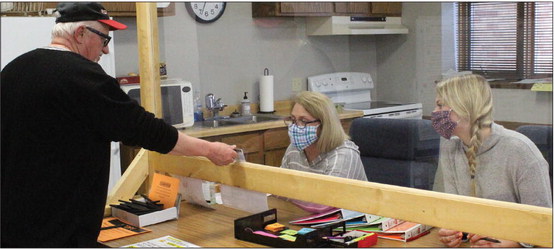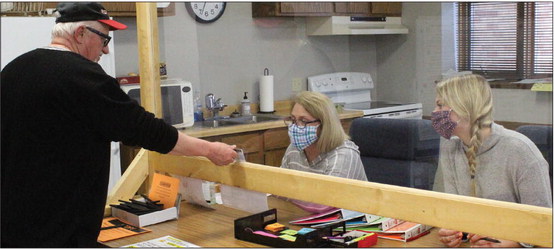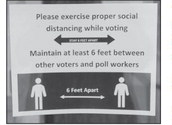Casting ballots despite COVID-19


Local clerks take steps to make voting as safe as possible
The normally humdrum spring election on Tuesday was anything but this year, as local clerks and poll workers did their best to accommodate in-person voters during a deadly pandemic.
As expected, the number of absentee ballots spiked while the supply of poll workers plunged, with the city of Abbotsford having to call in National Guard members to help city hall staff conduct the election.
“We don’t have any poll workers,” city administrator Dan Grady said Monday, before it was even clear if in-person voting was still going to proceed on Tuesday.
A cluster of court decisions less than 24 hours before the polls opened left the April 7 election intact, with absentee ballots needing to be turned in or postmarked no later than Tuesday.
Gov. Tony Evers on Monday ordered the election to be postponed until June 9, but the Wisconsin Supreme Court blocked that action by a 5-2 vote. The U.S. Supreme Court also eliminated an extended deadline for absentee ballots originally put in place by a federal judge.
On a local level, municipal clerks scrambled to put extra precautions in place to help prevent the spread of the COVID-19, which has infected over 2,000 Wisconsinites and killed nearly 100.
Polling places were equipped with sanitization stations, poll workers were provided with face masks, and six-foot social distancing spaces were marked with tape on the floors.
Despite the public health risks, some municipalities were reporting betterthan- expected turnout.
“I’m actually surprised by how many have showed up today,” Grady said at about noon on Tuesday.
Municipal clerks reported a deluge of absentee ballots. Grady said Abbotsford mailed out 99 absentee ballots this year, with 62 of them returned as of Monday. Normally, he said the city only sends out 10 to 15 absentee ballots. Another 65 people voted early in Abbotsford.
Colby city clerk Connie Gurtner said her office issued 242 absentee ballots for Tuesday’s election, and 215 of them had been returned as of Tuesday at 8 p.m. That’s nearly five times more than the average of 50 absentee ballots Colby usually sends out. Combined with the 164 people showed up to vote inperson, Colby saw its total turnout increase by 103 over the 2019 spring election.
Gurtner said five of the city’s 10 poll workers resigned due to COVID concerns, but she was able to replace them with her two daughters and their friends, who are home from college due to the coronavirus outbreak. She and deputy clerk Jessie Polivka also filled in when needed.
“I have hand sanitizer and wipes for poll workers to clean all surfaces between voters,” she said. “I have also trained all the poll workers on our new hand washing and sanitizing procedures.”
To create more space for social distancing, Gurtner also opened up the entire council room for voting to take place. This also allowed voters to enter through one door and exit through another.
Christie Erikson, the deputy clerk in Dorchester, said two of the village’s poll workers quit due to COVID concerns, leaving the remaining ones with a long day ahead of them.
“I already have a limited amount of poll workers, so the ones that I have working will work the whole day instead of two shifts,” she said.
Still, Erikson was confident that the election would run smoothly, since the poll workers who stayed on have been doing it for many years and are used to working with each other.
Dorchester sent out 72 absentee ballots this year, compared to an average of seven in most years, Erikson said. Another 14 people decided to vote early. A total of 77 Dorchester residents voted in person on Tuesday, she said, compared to 102 last year.
Even with in-person voting decreasing on Election Day, Erikson said she expects Dorchester to have close to the normal number of votes for a spring election once the absentees are counted in.
Like other municipalities, Dorchester provided masks and gloves for poll workers and also set up a plexiglass barrier in front of them to protect against the virus.
Erikson said they also had one extra person in charge of monitoring everyone to make sure they were washing their hands and social distancing.
Since absentee ballots will continue to be counted until April 13, Grady said municipalities are under strict instructions to keep the balloting machines locked down until then.
“We’re supposed to lock them up, and lock the room up and they’ll be off-limits until the 13th,” he said.


